People always ask me about worm food and what to feed their new worms when they are first setting up their bins.
Let me help you out and go over what I’ve found over the years so you can get your worms the right food right from the start.
What to feed your worms
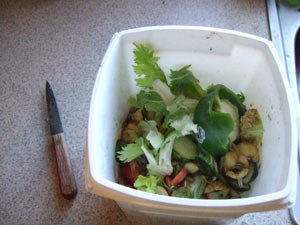 Basically, worms will eat any plant or anything that was a plant at one time. Kitchen scraps, leftover pulp from your juicer, grass clippings and AGED manure from plant eating animals are all good.
Basically, worms will eat any plant or anything that was a plant at one time. Kitchen scraps, leftover pulp from your juicer, grass clippings and AGED manure from plant eating animals are all good.
I see a lot of sites recommend that you feed your red wigglers paper or cardboard. Don’t do that. The worms will survive on newspaper, but they don’t reproduce at all and it makes them weak and unhealthy.
Keep the worm food moist
First of all, worms can only eat food that is decomposing. To rot, the food needs to be moist. So, whatever worm food you’re feeding, it has to be kept moist so it rots and the red worms can eat it.
I keep the food moist by putting a piece of cardboard or a stiff plastic sheet (not saran wrap) on the surface of the soil. You can water the bin as well, but this isn’t really a good idea since water in your bin is your enemy. More on that later in this post though.
How much to feed your worms
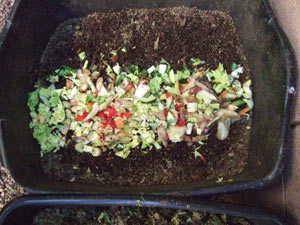 The amount of worm food you put in your bin will vary depending on how many worms you have. As a general rule, I feed a heaping handful of food two times a week if I have a bin with 1000 worms.
The amount of worm food you put in your bin will vary depending on how many worms you have. As a general rule, I feed a heaping handful of food two times a week if I have a bin with 1000 worms.
What you want to do is check the bin to see how much food is left. When most of it is gone, you’ll see dirt and tiny specks where the food used to be. At that point go ahead and put another handful of worm food in your worm composting bin.
There is one thing to watch out for so you don’t underfeed your red wigglers: If you are feeding them things with thick peels like cantaloupe, apples, pears or whole banana peels, it will look like there is a lot of food there, but all that’s left is the peels. So, make sure you check to see if there is any meat on the peels before deciding not to feed them.
Processing your worm food: Chop, freeze, puree, or what?
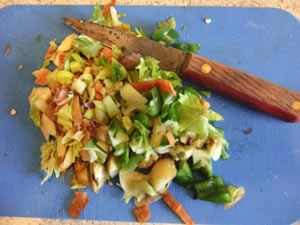
Remember, red wigglers can only eat food that is rotting. You can get the food in your composing bin edible faster if you chop it up a little bit. I put mine in a food processor for a few seconds until the pieces are the size of a dime or so. Bigger or smaller doesn’t matter much. If you only have a few thousand worms, you can just chop the worm food up on the kitchen counter. But…
Do not puree or liquefy your worm food. A big glob of slop poured on top of your soil takes a long time to decompose and your worms will go hungry waiting for that glob to decompose. Plus, liquefying adds too much water to your bin all at once.
Same with freezing your food before feeding it. Don’t do it. On a microscopic level, frozen plant cells explode and release all their water at once. That extra water will cause lots of problems in your bin, more on that a little further down this page.
Overfeeding your worms
You can’t really overfeed your red worms, they will eventually eat what you put in there. But overfeeding will cause excess water in your bin, and you don’t want that.
See, when you put a lot of food in at once and the worms can’t eat it in a few days, the food rots and the water from the worm food soaks your bin. Even if you have holes in the bottom of your bin and a silly spigots that come with commercial bins you can get online, your bin can get way too wet. And that is a major problem because…
What’s the problem with having too much water in a bin?
If your bin has too much water, the oxygen supply to the decomposing food is cut off. When that happens, things in your bin start to decompose anaerobically. The problem is the chemicals left over from anaerobic decomposition will kill your worms. And when I say, “kill your worms” I mean that you have about 2 days before they all die.
If the sides of your bin are covered in worms, the chemical by-products of anaerobic decomposition are probably poisoning your bin. You have to get your red wigglers out of there immediately and completely change your bin.
Here are the most common ways people get too much water in their bins and end up with a toxic bin plus ways to avoid the problem:
- Overfeeding. (Only feed as much chopped up food as your worms can eat in a week or less.)
- Watering their bins too much. (Instead, cover the worm food with cardboard or a plastic sheet.)
- Pureeing or liquefying the worm food. (Just chop your worm food up into chunks.)
- Freezing their worm food. (Feed the worms food from the fridge, compost bucket or right from the kitchen counter.)
What if I go on vacation and will be gone for more than a week?
Since you don’t want to put in more than a week’s worth of fresh chopped up food in your bin at one time, you need something to feed them when you’ll be gone on vacations or whatever.
There are two things I personally fall back on in these cases. Neither of them are hard, but both of them take a little preparation before-hand.
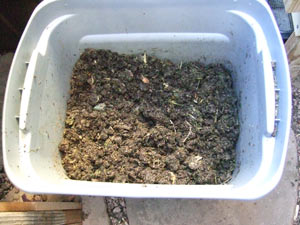
Compost: My first choice is to simply cut up about 5 gallons of fruit and veggie scraps and throw them in a bucket. Then I add about a gallon of coconut coir and a gallon of peat moss and mix everything up.
After about a week, this mixture turns into black compost that I feed my worms. I just heap it into my worm compost bins before I leave on my trip and the worms are fine.
Manure:
I also feed AGED manure while I’m gone on vacations. I like rabbit poop, but if you use rabbit manure you have to get the pee out of it before you can use it as worm food. To get the urine out, just rinse it twice before you let it age. You’ll know the urine is out of it when it doesn’t smell like ammonia anymore.
I’ve also used cow and horse manure. I haven’t tried other kinds of manure so I can’t say whether they will work or not.
To age manure, get it soaking wet in a tub with a wire mesh bottom so the extra water drains out. Then you just let it sit for at least 4 months so all the excess nitrogen leaches or ages out of it. After that, it makes an excellent worm food that you can just scoop into your bin when you leave for long periods of time.
What are worm’s favorite foods?
I’m sure there are more, and if you discover something that your worms really enjoy, please let me know.
- Bananas: Worms love bananas, peels and all. I usually just split the half rotten bananas down the middle and put them in the bin fruit side down.
- Squash: They absolutely love melons, squash and pumpkins. After every Halloween I ask neighbor’s for their pumpkins to feed my worms. I get some strange looks sometimes, but usually they are excited to see my garden.
- Avocados: Another big favorite is avocados. You can put them in the bin or peel and mash them.
What NOT to feed your worms
- Bread and Pasta: I’ve read on other sites that red wigglers like pasta and bread. They don’t. They will eat them if they there’s nothing else, but they don’t like them.
- Grains: commercial worm farmers feed their worms grain, usually oatmeal, before shipping them to get the worms to retain water and weigh more. The seller knows the worms will stress out and dehydrate during shipping so they force their worms to hold extra water so they survive the trip in the mail. If you feed grains consistently, it will kill your worms, and any grain that gets moldy will kill your worms as well.
- Citrus: Lemons, oranges, limes, grapefruit and other citrus fruits have an oil in the peel that will kill your worms. The peeled fruit is okay to feed your worms, but too much will make your bin acidic.
- Hot peppers: Green peppers are okay, but don’t feed any hot peppers or chilies. There is an oil in the skin that will kill your worms on contact.
- Onions: This includes leeks, scallions and garlic.
Getting more information
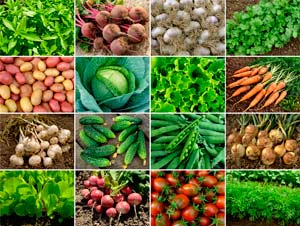
If you are a past customer or you plan on getting your worms from me and you have any questions, just give me a call and I will be happy to answer your questions about worm food, what they will or won’t eat, and anything else you want to know.
Also, if you are looking to make or buy a bin that eliminates a lot of the problems with extra water in the bin, check out this post on making a simple worm bin. I tell you how to get a bin with worms from me at the bottom of that post.
